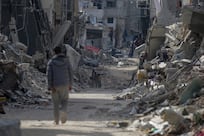ABU DHABI // Bangladeshi expatriates yesterday revealed their fears for their loved ones at home after Tropical Storm Mahasen hit the country's south coast.
Many of the 700,000 living in the UAE have been phoning home concerned about the welfare of their families.
The storm has killed at least 12 people, injured hundreds and displaced almost a million in low-lying coastal areas and neighbouring Myanmar.
The authorities had prepared for a cyclone but Mahasen weakened before making landfall.
Shaukat Hossain, who lives in Abu Dhabi, said: "Thank God my family is safe there. It's because the cyclone slowed down but there is waterlogging on the streets due to the constant rain. I talked to my family at about 3pm [yesterday] and they were fine but my 10-year-old son was asking me, 'dad, please come, I want to see you'."
Imrad Hossain said his family were fine but faced a continuous downpour of rain and fierce winds of up to 150kph.
Mohammed Khalid said: "My family told me that 200 security personnel were deployed in the area and they are helping people navigate through the flooded roads and streets."
The Bangladesh Embassy in Abu Dhabi has been coordinating with its government to gauge the loss of property and lives.
The storm first hit Khepupara, on the south coast, before reaching Chittagong and Cox's Bazar, a port 90 kilometres south of Chittagong.
An embassy councillor, Mohammed Shahadat Husain, yesterday said: "Seven people have died and over 100 were injured in the incident but the number of casualties might go up, which only can be determined late in the evening."
The Bangladesh government evacuated nearly a million people, including 200,000 in Cox's Bazar and 20,000 in Lakshmipur, south of the capital, Dhaka.
"The damage could be huge but we cannot speculate until final reports come from the government of Bangladesh," Mr Husain added.
In the coastal areas, people were vulnerable because there are an inadequate number of cyclone shelters and protective dykes, said Wilfred Sikukula, the director of humanitarian emergency affairs at the World Vision charity.
"Many people are unwilling to move out to safety, leaving behind their livestock and property," he said. "As per the latest storm trajectory, 4.1 million people have been identified as living in at-risk areas in the districts of Chittagong and Cox's Bazar."
Mr Sikukula said World Vision had volunteer medical teams ready to help at five shelters.
In the UAE, Iftikhar Husain Babool, who lives in Abu Dhabi, was happy that his wife and three children were safe.
"I have communicated with my wife, relatives and friends," he said. "They are safe now but I want them to be brave enough to face the consequences if the worst occurs.
"The communication lines are working properly but we suspect they could be badly hampered."
His family said the storm was getting weaker and moving towards less populated regions.
Mohammed Dalayath Husain, from Chittagong, was worried about his parents and sister.
"On Wednesday night, when I heard that a cyclone had been forming in the Indian Ocean, I alerted my family back home," he said. "I talked to them this afternoon and they are doing fine as the wind slowed and the cyclone was getting weaker."
"My home is about 30km inside the city and my sister told me it has been raining incessantly but no damages were reported."
By last night, authorities in Bangladesh said damage was not as bad as had been originally feared.
[ anwar@thenational.ae ]





